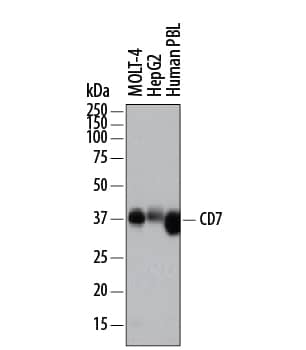Human CD7 Antibody
R&D Systems, part of Bio-Techne | Catalog # AF7579

Key Product Details
Species Reactivity
Validated:
Cited:
Applications
Validated:
Cited:
Label
Antibody Source
Product Specifications
Immunogen
Ala26-Pro180
Accession # P09564
Specificity
Clonality
Host
Isotype
Scientific Data Images for Human CD7 Antibody
Detection of Human CD7 by Western Blot.
Western blot shows lysates of MOLT-4 human acute lymphoblastic leukemia cell line, HepG2 human hepatocellular carcinoma cell line, and human peripheral blood lymphocytes (PBL). PVDF membrane was probed with 0.5 µg/mL of Sheep Anti-Human CD7 Antigen Affinity-purified Polyclonal Antibody (Catalog # AF7579) followed by HRP-conjugated Anti-Sheep IgG Secondary Antibody (Catalog # HAF016). A specific band was detected for CD7 at approximately 35-40 kDa (as indicated). This experiment was conducted under reducing conditions and using Immunoblot Buffer Group 1.Detection of CD7 in Human PBMCs by Flow Cytometry.
Human peripheral blood mononuclear cells (PBMCs) were stained with Mouse Anti-Human CD3e APC-conjugated Monoclonal Antibody (Catalog # FAB100A) and either (A) Sheep Anti-Human CD7 Antigen Affinity-purified Polyclonal Antibody (Catalog # AF7579) or (B) Sheep IgG Control (Catalog # 5-001-A) followed by Phycoerythrin-conjugated Anti-Sheep IgG Secondary Antibody (Catalog # F0126).CD7 in Human PBMCs.
CD7 was detected in immersion fixed human peripheral blood mononuclear cells (PBMCs) using Sheep Anti-Human CD7 Antigen Affinity-purified Polyclonal Antibody (Catalog # AF7579) at 15 µg/mL for 3 hours at room temperature. Cells were stained using the Northern-Lights™ 557-conjugated Anti-Sheep IgG Secondary Antibody (red; Catalog # NL010) and counterstained with DAPI (blue). Specific staining was localized to cytoplasm and plasma membrane. View our protocol for Fluorescent ICC Staining of Cells on Coverslips.Applications for Human CD7 Antibody
CyTOF-ready
Flow Cytometry
Sample: Human peripheral blood mononuclear cells (PBMCs)
Immunocytochemistry
Sample: Immersion fixed human peripheral blood mononuclear cells (PBMCs)
Immunohistochemistry
Sample: Immersion fixed paraffin-embedded sections of human thymus
Western Blot
Sample: MOLT‑4 human acute lymphoblastic leukemia cell line, HepG2 human hepatocellular carcinoma cell line, and human peripheral blood lymphocytes (PBL)
Formulation, Preparation, and Storage
Purification
Reconstitution
Formulation
Shipping
Stability & Storage
- 12 months from date of receipt, -20 to -70 °C as supplied.
- 1 month, 2 to 8 °C under sterile conditions after reconstitution.
- 6 months, -20 to -70 °C under sterile conditions after reconstitution.
Background: CD7
CD7 (Cluster of Differentiation Antigen 7; also Leu-9, TP41 and GP40) is a 40-44 kDa member of the Ig-superfamily of proteins. It shows restricted expression, being found on fetal thymocytes, CD34+ myeloid and lymphoid progenitor cells, memory CLA- CD45RA+ T cells, and CD56+ IFN-gamma secreting NK cells. CD7 binds to both SECTM1/K12 and galectin-1, and when bound to the latter, initiates complex formation with CD43 in cis. Activation of CD7 may result in either cell proliferation or apoptosis, suggesting a context-dependent signaling mechanism. Mature human CD7 is a 215 amino acid (aa) type I transmembrane glycoprotein. It contains a 155 aa extracellular region (aa 26-180) that shows one V-type Ig-like domain (aa 26-130), and a 39 aa C-terminal cytoplasmic domain. There is one potential alternative splice variant that contains a 79 aa substitution for aa 133-240. Over aa 26-180, human CD7 shares only 43% aa sequence identity with mouse CD7.
Alternate Names
Gene Symbol
UniProt
Additional CD7 Products
Product Documents for Human CD7 Antibody
Product Specific Notices for Human CD7 Antibody
For research use only



